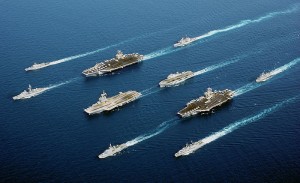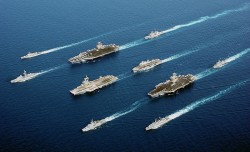 …today, about the constitution of modern fleets? When Corbett spoke about battleships, cruisers and the flotilla, he focused on the integrated fleet functions these ships performed more than their individual capabilities. Even their names reflected this attitude, contrary to later ship types like the aircraft carrier, submarine or torpedo boat. Corbett was aware that such classification was not constant and that technology was rearranging the old structure of fleets:
…today, about the constitution of modern fleets? When Corbett spoke about battleships, cruisers and the flotilla, he focused on the integrated fleet functions these ships performed more than their individual capabilities. Even their names reflected this attitude, contrary to later ship types like the aircraft carrier, submarine or torpedo boat. Corbett was aware that such classification was not constant and that technology was rearranging the old structure of fleets:We retain the three-fold nomenclature, but the system itself has really gone. Battleships grade into armoured cruisers, armoured cruisers into protected cruisers. We can scarcely detect any real distinction except a twofold one between vessels whose primary armament is the gun and vessels whose primary armament is the torpedo. But even here the existence of a type of cruiser designed to act with flotillas blurs the outline, while, as we have seen, the larger units of the flotilla are grading up to cruiser level.”
Corbett believed that the constitution of fleets ought to reflect the dominant strategic and tactical ideas at a given time. With these thoughts in mind, what kind of prevailing strategic and tactical ideas are expressed by structureless fleet? Do modern navies posses a clear structure? If not, either his theories are obsolete or our concept of ships and fleets is dangerously detached from strategy.
Confusion over fleet constitution, in any time, seems to be caused by three reasons. One is technology, and the addition of new capabilities. Another is perhaps best expressed in the wisdom of Thucydides regarding the reasons for conducting a war – Fear, Honor and Benefit. Fear is rooted deeply in psychology and affects the perceived level of threat. The final reason is inability to predict the future, despite all scientific progress in forecasting. Attempting to follow Corbett’s logic, a navy performs the basic functions of striking, scouting and screening in three dimensions – surface, air and below surface. The three sources of confusion, on the other hand, cause navies to give a ship capabilities in all functional areas and in all domains at the same time. We want to give our scouting force fighting power, forgetting a bit about another statement from Corbett:
The object of naval warfare is to control maritime communications. In order to exercise that control effectively we must have a numerous class of vessels specially adapted for pursuit. But their power of exercising control is in proportion to our degree of command, that is, to our power of preventing their operations being interfered with by the enemy. Their own power of resistance is in inverse proportion to their power of exercising control; that is to say, the more numerous and better adapted they are for preying on commerce and transports, the weaker will be their individual fighting power.”
At this point LCS comes to my mind. Still controversial and presenting challenges to implementation, this project possesses a unique capability. Through modularity and autonomous, off-board systems, it offers a possibility to correct errors in its initial operating concept. Controversy surrounding this ship would be best resolved by return to the roots of the concept and intended function. Answering the question “what is this ship?” is far more important than its actual capabilities. The story of HMS Jervis Bay dramatically illustrates the difference between concept and capability. In May 1940, this armed merchant ship was performing its function of escorting a convoy, consisting of 37 ships, when they encountered German pocket battleship Admiral Scheer. The price for the British was high as almost 200 men died and the ship lost, but the HMS Jervis Bay fulfilled its mission despite having almost no capabilities, charging the Admiral Scheer and enabling the convoy to escape. One way to avoid paying such a price is to give every ship enough fighting power (with all the attendant controversy over exactly how much is enough). Another is to give fleet a more defined structure:
On cruisers depends our exercise of control; on the battle-fleet depends the security of control.”
Closing the loop and returning to the opening question. The chapter title in which Sir Julian Corbett expressed his views on fleet structure is “THEORY OF THE MEANS—THE CONSTITUTION OF FLEETS.” The subject so defined will never be obsolete. I am still curious how he would today find a way through the jungle of new technological innovations which seem to force us to constantly revise operating concepts, and bring us a clear view on the theory of the means.
Przemek Krajewski alias Viribus Unitis is a blogger In Poland. His area of interest is broad context of purpose and structure of Navy and promoting discussions on these subjects In his country


One thought on “What Would Sir Julian Corbett Write…”